
BMJ Health & Care Informatics
Scope & Guideline
Pioneering the Future of Health Informatics and Technology
Introduction
Aims and Scopes
- Digital Health Technologies:
The journal emphasizes the development, implementation, and evaluation of digital health technologies, including telemedicine, mobile health applications, and electronic health records, to improve healthcare access and outcomes. - Artificial Intelligence in Healthcare:
Research on the role of artificial intelligence (AI) in clinical decision support, risk stratification, and predictive modeling is central to the journal's scope, focusing on both opportunities and challenges associated with AI integration. - Patient-Centered Care:
The journal promotes studies that enhance patient engagement and satisfaction through user-centered design and the co-creation of health interventions, aiming to address diverse patient needs. - Health Informatics and Data Analytics:
BMJ Health & Care Informatics highlights the use of health informatics and data analytics to derive insights from health data, improve clinical workflows, and inform public health strategies. - Equity and Accessibility in Healthcare:
The journal addresses issues of health equity and accessibility, particularly in the context of digital health interventions, ensuring that advancements benefit all patient populations.
Trending and Emerging
- AI and Machine Learning Applications:
There is a significant increase in studies exploring AI and machine learning applications, particularly in predictive modeling, clinical decision support, and personalized medicine, highlighting the growing reliance on data analytics in healthcare. - Mental Health and Digital Solutions:
Research focusing on mental health interventions using digital platforms has gained momentum, particularly in light of the COVID-19 pandemic, emphasizing the importance of mental wellness in healthcare. - Healthcare Workforce Dynamics:
The intersection of technology and healthcare workforce dynamics, including studies on burnout and AI's impact on clinician workload, is emerging as a key theme, reflecting concerns about clinician well-being in high-stress environments. - Health Equity and Social Determinants:
There is a rising trend in research addressing health equity and the impact of social determinants on health outcomes, emphasizing the need for inclusive health technologies that cater to diverse populations. - Integration of Digital Biomarkers:
The exploration of digital biomarkers for monitoring patient health and predicting outcomes is an emerging focus, showing promise in enhancing personalized healthcare approaches.
Declining or Waning
- Traditional Health Information Systems:
Research focusing solely on traditional health information systems without the integration of newer technologies has declined, reflecting a shift towards more innovative and integrated health solutions. - General Telehealth Applications:
While telehealth remains relevant, there has been a waning focus on generic telehealth applications, as more specific studies addressing telehealth's role in chronic disease management or mental health emerge. - Non-Digital Health Interventions:
Research on non-digital health interventions appears less frequently as the journal increasingly prioritizes studies that incorporate digital technologies and data-driven approaches.
Similar Journals
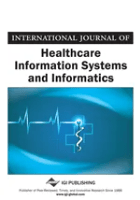
International Journal of Healthcare Information Systems and Informatics
Transforming healthcare through innovative information systems.International Journal of Healthcare Information Systems and Informatics is a prestigious academic journal published by IGI Global, focusing on the vital intersection of healthcare and information technology. With an ISSN of 1555-3396 and E-ISSN of 1555-340X, this journal serves as a pivotal platform for researchers, professionals, and students to explore innovative solutions and advancements in healthcare informatics. As of 2023, it holds a commendable Q3 ranking in categories such as Information Systems and Medicine, highlighting its significant contribution to the academic community. Covering a wide range of topics from healthcare data management to the implementation of information systems in clinical settings, the journal aims to foster critical discussions and disseminate impactful research. With a publication history spanning from 2006 to 2024, it continues to play a crucial role in guiding the future of healthcare information systems. Readers can access this journal through traditional subscription methods, ensuring that leading-edge research reaches those most invested in the evolution of healthcare informatics.
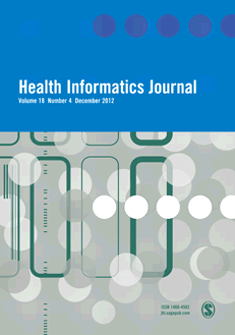
Health Informatics Journal
Empowering professionals with accessible health research.Health Informatics Journal, published by SAGE Publications Inc., serves as a premier platform for research and discussion in the dynamic field of health informatics since its inception in 1995. With an impressive Q2 ranking in the Health Informatics category and a notable 77th percentile ranking in the Scopus database, this journal provides an essential resource for academics and professionals alike. The journal's transition to Open Access since 2020 has further broadened its reach, ensuring that innovative research is accessible to a global audience. Covering a wide range of topics within health informatics, the journal aims to foster high-quality scholarly communication and facilitate the dissemination of cutting-edge insights that can help advance health care delivery and patient outcomes. With an ongoing commitment to excellence, the Health Informatics Journal is dedicated to enhancing the intersection of technology and healthcare through rigorous research and collaborative exploration.
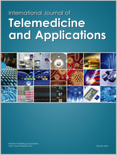
International Journal of Telemedicine and Applications
Exploring the future of healthcare delivery through telemedicine.International Journal of Telemedicine and Applications is a premier open-access journal published by HINDAWI LTD, focused on the rapidly evolving field of telemedicine and health informatics. With an ISSN of 1687-6415 and E-ISSN of 1687-6423, this journal has been a key resource for researchers, healthcare professionals, and students since its inception in 2007. Based in Egypt, the journal has established a global presence, reflected in its diverse range of articles that cover topics from computer networks to health information management. Its impact is underscored by its impressive rankings in Scopus, including notable positions such as 34th in Health Informatics and 15th in Health Information Management. The journal is classified in Q2 quartiles for four influential categories, showcasing its relevance and contribution to the field. With an ongoing publication timeline from 2008 to 2024, International Journal of Telemedicine and Applications is crucial for advancing knowledge and practice in telemedicine, offering researchers and practitioners the opportunity to explore innovative solutions in healthcare delivery.

International Journal of E-Health and Medical Communications
Innovating healthcare delivery with cutting-edge technology.Welcome to the International Journal of E-Health and Medical Communications, a pivotal publication designed to bridge the gap between health informatics and computer science applications. Published by IGI Global, this journal serves as a platform for innovative research and insights into e-health technologies, health communication strategies, and the evolving role of digital tools in enhancing healthcare delivery and management. With an ISSN of 1947-315X and E-ISSN 1947-3168, it caters to an audience keen on advancing the intersection of technology and health, as evidenced by its respectable standings in Scopus rankings—positioned in the 64th percentile in Health Informatics and 63rd in Computer Science Applications. Over its publication history from 2010 to 2024, the journal has consistently contributed to significant discussions and advancements within these fields, highlighted by its Q3 quartile ranking in 2023. Join a community of researchers, professionals, and students dedicated to the ongoing exploration of e-health, as we collectively navigate the complex landscape of healthcare innovation.
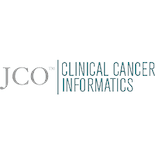
JCO Clinical Cancer Informatics
Elevating cancer care through collaborative informatics solutions.Welcome to JCO Clinical Cancer Informatics, an esteemed journal at the forefront of the intersection between oncology and health informatics. Published by Lippincott Williams & Wilkins, this journal is dedicated to advancing the understanding and application of cancer data through innovative informatics solutions. Since its inception in 2017, JCO Clinical Cancer Informatics has established itself as a critical resource for researchers, practitioners, and students, as evidenced by its high rankings in the 2023 Scimago Quartiles—Q2 in Cancer Research and Q1 in both Health Informatics and Oncology. With a commitment to open access, this journal aims to disseminate groundbreaking research findings that enhance cancer care and inform public health strategies. Positioned in the United States, it serves as a pivotal platform for sharing knowledge and fostering collaboration within the global cancer research community.

Health Information Management Journal
Empowering Leaders in Health Information ManagementHealth Information Management Journal, published by SAGE Publications Inc., is a premier academic resource dedicated to the intersection of health informatics, health information management, health policy, and leadership in health services. With an impressive track record since its inception in 2002, this journal steadily contributes to scholarly dialogue and innovation in the field, holding a commendable Q2 ranking in Health Informatics, Health Information Management, and Health Policy, and a distinguished Q1 ranking in Leadership and Management as of 2023. As a critical platform for researchers, professionals, and students, it fosters the dissemination of cutting-edge research and practical applications, bridging the gap between theory and practice. Though not an open-access journal, it provides a wealth of subscription-based resources that are invaluable for advancing knowledge and improving health systems globally. The journal’s commitment to high-quality, peer-reviewed content ensures that it remains a vital tool for anyone invested in the future of health information management.

JAMIA Open
Pioneering research in the realm of health informatics.JAMIA Open is an open-access journal dedicated to advancing the field of health informatics, published by Oxford University Press. Since its inception in 2018, the journal has provided a platform for novel research, reviews, and case studies that bridge the gap between healthcare and information technology. With an impressive impact factor and a current classification in the Q2 quartile for Health Informatics, JAMIA Open has established itself as a vital resource for researchers and practitioners alike, facilitating the dissemination of innovative findings that contribute to the evolution of healthcare systems. Based in the United States, the journal is committed to providing free and equitable access to high-quality research, thus promoting a collaborative and informed approach to tackling pressing health issues. As it continues to grow and evolve, JAMIA Open remains a cornerstone in the landscape of health informatics, appealing to a diverse audience of researchers, professionals, and students looking to inspire change in their fields.

Intelligent Medicine
Exploring the intersection of AI and biomedical engineering.Intelligent Medicine, published by Elsevier, is a leading open-access journal dedicated to advancing the fields of Artificial Intelligence, Biomedical Engineering, Health Informatics, and related areas within Medicine. Since its inception in 2021, it has quickly established itself among the top tier of academic publications, holding a commendable Q2 ranking in several categories, including a rank of #51 in Health Informatics and #104 in Medicine (Miscellaneous) as of 2023. The journal aims to disseminate innovative research that harnesses AI technologies to improve healthcare outcomes, bridging the gap between cutting-edge technology and medical practice. With its open-access model, Intelligent Medicine ensures broad dissemination of research findings, facilitating collaboration and knowledge sharing among researchers, practitioners, and students globally. Located in Amsterdam, Netherlands, this journal plays a pivotal role in shaping the future of intelligent healthcare solutions, inviting submissions that push the boundaries of conventional medicine through creative and impactful research.
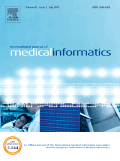
INTERNATIONAL JOURNAL OF MEDICAL INFORMATICS
Championing Excellence in Medical Informatics ResearchInternational Journal of Medical Informatics, published by Elsevier Ireland Ltd, is a premier peer-reviewed journal dedicated to advancing the field of health informatics. Established in 1997, this journal has consistently strived to disseminate high-quality research and innovative practices, now recognized in the Q1 quartile of health informatics for 2023, ranking impressively at #24 out of 138 in Scopus. The journal's focus encompasses the integration of computer science and information technology in healthcare, fostering discussions on data management, telemedicine, health information systems, and decision support mechanisms. With an ISSN of 1386-5056 and E-ISSN of 1872-8243, it provides options for both subscription and open access, ensuring broad dissemination of research findings. As a vital resource for researchers, professionals, and students in the rapidly evolving domain of medical informatics, the International Journal of Medical Informatics is positioned to be at the forefront of knowledge translation in the health sector, contributing significantly to improvements in patient care and healthcare delivery.

Healthcare Technology Letters
Exploring the future of health informatics and patient care.Healthcare Technology Letters is a leading open-access journal published by WILEY that has been at the forefront of disseminating cutting-edge research in the field of health informatics and health information management since its inception in 2014. With an E-ISSN of 2053-3713, this esteemed journal is recognized for its commitment to advancing knowledge and practice in healthcare technology, making it a vital resource for researchers, professionals, and students alike. The journal's scope encompasses a wide range of topics, including digital health solutions, data management, and innovative technologies that enhance patient care. It holds a respectable position in the academic community, featuring a Q3 ranking in both health informatics and health information management as of 2023, and consistently contributing to high-impact research evidenced by its Scopus rankings. By providing open access to its content since 2017, Healthcare Technology Letters ensures that valuable insights and breakthroughs can reach a broader audience, furthering the impact of its published work on the global health landscape.